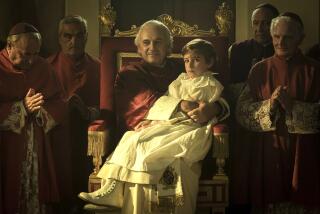Mozart’s Turkish Delight in Triplicate
- Share via
Amid the 1991 bicentennial overkill, not a single recording appeared of “Die Entfuhrung aus dem Serail” (The Abduction From the Seraglio), the least dramatically viable--this has no bearing on the composer’s musical inventiveness--of Mozart’s mature operas.
In the half-year since, we’ve had three new versions. Its time has come--on recordings, at any rate.
The delectable, bangy-jangly “Turkish” rhythms and instrumentation, with striking use of piccolo, triangle, cymbals and bass drum, are smartly projected by conductor Christopher Hogwood and his Academy of Ancient Music (L’Oiseau-Lyre 430 339, two CDs).
One must marvel at how secure and accomplished these performers on period instruments have become since their very tentative recorded traversal of Mozart’s symphonic output a decade ago. Interpretively, however, Hogwood’s Mozart remains problematic.
In this “Abduction” there is more or less one kind of fast tempo (very fast) and one slow (quite slow). Speed impersonates energy, while an overabundance of clipped phrase endings subverts lyric flow and dramatic expression. There is little feeling of the tenderness inherent in a work dealing with lovers separated by cultures and both real and perceived villainy.
The cast is a good one, topped by Lynne Dawson, a warm, sympathetic Konstanze who shows both metal and mettle in that most extraordinary concertante aria “Martern aller Arten.”
Uwe Heilmann’s sweet, fragile tenor is intelligently employed as Belmonte, and Gunther von Kannen is crustily funny and vocally adept as the harem overseer, Osmin. The lower-class lovers are crisply delineated by Marianne Hirsti and Wilfried Gahmlich, while Wolfgang Hinze speaks Pasha Selim’s platitudes nobly.
Although Bruno Weil’s conducting of the Vienna Symphony doesn’t make the most of the score’s dramatic contrasts, his tempos and dynamics are more varied than Hogwood’s, while his sterling cast delivers the plot convolutions as adeptly as it delivers the music (Sony 48053, two CDs).
The gutsy, versatile American soprano Cheryl Studer is Konstanze, fulfilling Mozart’s explicit musical demands (no easy matter) and handling the implicit ornamentation with rare, historically informed imagination.
Studer’s partner is another American, tenor Kurt Streit, an exceedingly agile, mellifluous Belmonte who can, unlike his counterpart for Hogwood, put some pressure on his lyric instrument without causing it to buckle.
Gunther Missenhardt, while hardly a vocal paragon, cannily differentiates between the genuinely menacing and lovable caricature-baddy aspects of Osmin. Elzbieta Szmytka, as the pert apple of his lustful eye, may be a tougher cookie than Osmin deserves, but her partner, tenor Robert Gambill--another gifted American--strikes the right note of cocky bonhomie. Michael Heltau is a more than usually believable Pasha.
In all, Sony’s strikes this listener as the most thoughtful and accomplished “Abduction” currently available on recordings.
The third new edition of the opera (Capriccio 10403/4, two CDs) is a travesty, beginning with Marcello Viotti’s listless conducting of the Frankfurt Radio Orchestra.
Best known among the singers is Kurt Rydl, Vienna’s basso of the moment. But his Osmin is a humorless ogre who, moreover, skirts Mozart’s pitches with lamentable consistency.
It may be an act of kindness not to mention the other hard-working, overparted cast members by name, but a discouraging word is in order regarding the “dramatic concept” employed: Librettist Gottlieb Stephanie’s spoken recitatives--which didn’t hamper Mozart’s creativity--have been replaced by putatively relevant texts, read by a story lady.
These passages, from the Koran, Boccaccio, Lady Montagu (an 18th-Century English visitor to Turkey) and Gotthold Lessing, deal with Mideastern attitudes toward women and Christian-Arab relations, with a dollop of pro-Jewish sentiment wedged in as well.
Teutonic pretentiousness has transformed a musical masterpiece inspired by a slight tale of amorous intrigue, with mild cross-cultural overtones, into a ponderous, incoherent sociopolitical treatise.
More to Read
The biggest entertainment stories
Get our big stories about Hollywood, film, television, music, arts, culture and more right in your inbox as soon as they publish.
You may occasionally receive promotional content from the Los Angeles Times.










